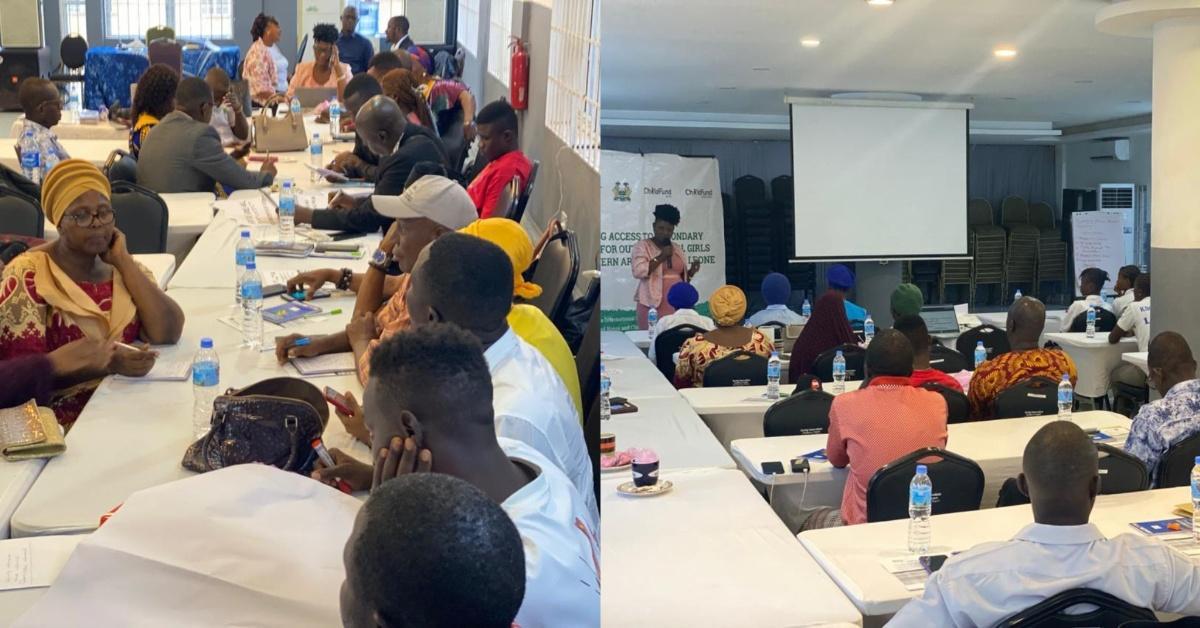Africa-Press – Sierra-Leone. ChildFund sierra Leone in Partnership with The Korea International Cooperation Agency, on Tuesday, 25th November 2025, convened a comprehensive project review meeting in Freetown to assess progress made under the initiative titled “Increasing Access to Secondary Education for Out-of-School Girls in the Western Area of Sierra Leone.”
The event, held at Saphyre Court in Brookfields, brought together government officials, re-enrolled adolescent girls, school administrators and key community stakeholders.
The project funded by KOICA, ChildFund Korea and ChildFund International aims to improve enrollment, retention and learning outcomes for out-of-school girls by strengthening school infrastructure, enhancing teacher capacity and increasing community participation in child protection and education.
Project Overview
ChildFund’s Jeremiah Sawyer presented an overview of the initiative, outlining its core objective: expanding access to secondary education for out-of-school girls. He noted that the project is driven by three major outputs safe learning environments, educational support for vulnerable girls and strengthened community engagement.
Under Output 1, six new school buildings were constructed across six schools. Each building contains three classrooms, a principal’s office, a storage room and a disability-friendly ramp. Six gender-sensitive VIP latrines were also completed, along with training for 139 teachers through 12 capacity-building workshops. Sawyer noted that more than 600 stakeholders attended handover ceremonies marking the completion of these facilities.
Output 2 focused on direct educational support. A total of 441 core textbooks were distributed; 327 girls benefitted from catch-up classes; and 360 solar-powered radios were provided for home learning. Four Early Childhood Development (ECD) centres also offered daycare support to enable teenage mothers to remain in school. Child Rights Clubs further launched violence-prevention campaigns in beneficiary schools.
Under Output 3, community participation was strengthened through training for 60 stakeholders on child-protection laws, the enactment of community byelaws to minimise school dropouts and the development of retention strategies by 390 members of community structures, including MSGs, MAGs and CWCs.
Results and Achievements
Presenting the evaluation report, ChildFund Monitoring and Evaluation Officer Martha Kallon highlighted notable achievements recorded since the project’s inception:
326 out-of-school girls re-enrolled into junior and senior secondary schools.
18 new classrooms reduced overcrowding from 55 pupils per class to an average of 40.
10,865 pupils now access safe water through six mechanized solar-powered boreholes.
Gender-sensitive VIP latrines and handwashing stations improved sanitation and hygiene.
840 units of modern school furniture enhanced classroom comfort.
Four ECD centres supported teenage mothers, improving retention.
441 textbooks, uniforms, shoes and learning materials boosted school readiness.
139 teachers trained in radical inclusion, safeguarding and modern pedagogy demonstrated improved teaching practices.
Child Rights Clubs actively mediated conflicts and promoted non-violence.
23 out-of-school girls passed the BECE with strong results, and four qualified for tertiary studies.
Kallon noted that more than 90% of re-enrolled girls have remained in school, attributing this achievement to catch-up classes, home visits, psychosocial support and improved learning environments.
Evaluation Findings
The evaluation highlighted improved learning outcomes driven by upgraded school infrastructure, accessible WASH services, trained teachers and adequate teaching and learning materials. Community structures including MAGs, MSGs, CWCs and CTAs have become instrumental in monitoring attendance, conducting home visits and mentoring girls.
The involvement of government ministries, local council representatives and religious leaders has further strengthened ownership and sustainability.
On Challenges, Lessons Learned and Mitigation Isatu Venn, Programs and Sponsorship Director in her presentation cited several implementation challenges:
Six girls were prevented from writing the WASSCE due to missing continuous assessment records.
A construction company failed to complete a solar-powered borehole, leading to contract termination.
Implementation delays occurred due to national elections and the attempted coup.
Mitigation measures included an MBSSE waiver allowing all out-of-school girls to sit public exams, successful recovery of funds through a bank guarantee, re-bidding of the borehole contract and approval to roll over delayed activities to early Year 2.
Key lessons learned included the importance of awarding no more than two construction lots per contractor and securing bank guarantees to ensure accountability.
Sustainability and Best Practices
The project’s sustainability is anchored in strong community ownership, alignment with the government’s Radical Inclusion Policy and long-term functionality of teacher training, classroom infrastructure and WASH systems.
Best practices identified include active community participation, strengthened partnerships with government agencies, adherence to safeguarding policies and improved project visibility through storytelling and documentation.
Stakeholder Testimonies
Stakeholder representatives from FAWE, out-of-school girls, teachers, MSGs, MAGs, CWCs, CTAs and other community structures gave testimonies as direct beneficiaries of the ChildFund and KOICA project.
They expressed deep appreciation for the extensive support received, noting that the initiative contributed significantly to the development of their schools through the construction of new classroom blocks, provision of WASH facilities, improvement of sanitation systems and delivery of comprehensive teacher capacity-building workshops. They emphasized that these interventions have strengthened teaching quality, deepened community engagement and improved support for girls’ education.
The review meeting reaffirmed that the KOICA–ChildFund project is driving measurable improvements in girls’ education across the Western Area. With strengthened school systems, empowered teachers, engaged communities and upgraded facilities, stakeholders expressed confidence that the project’s impact will continue long after the intervention concludes.
For More News And Analysis About Sierra-Leone Follow Africa-Press






